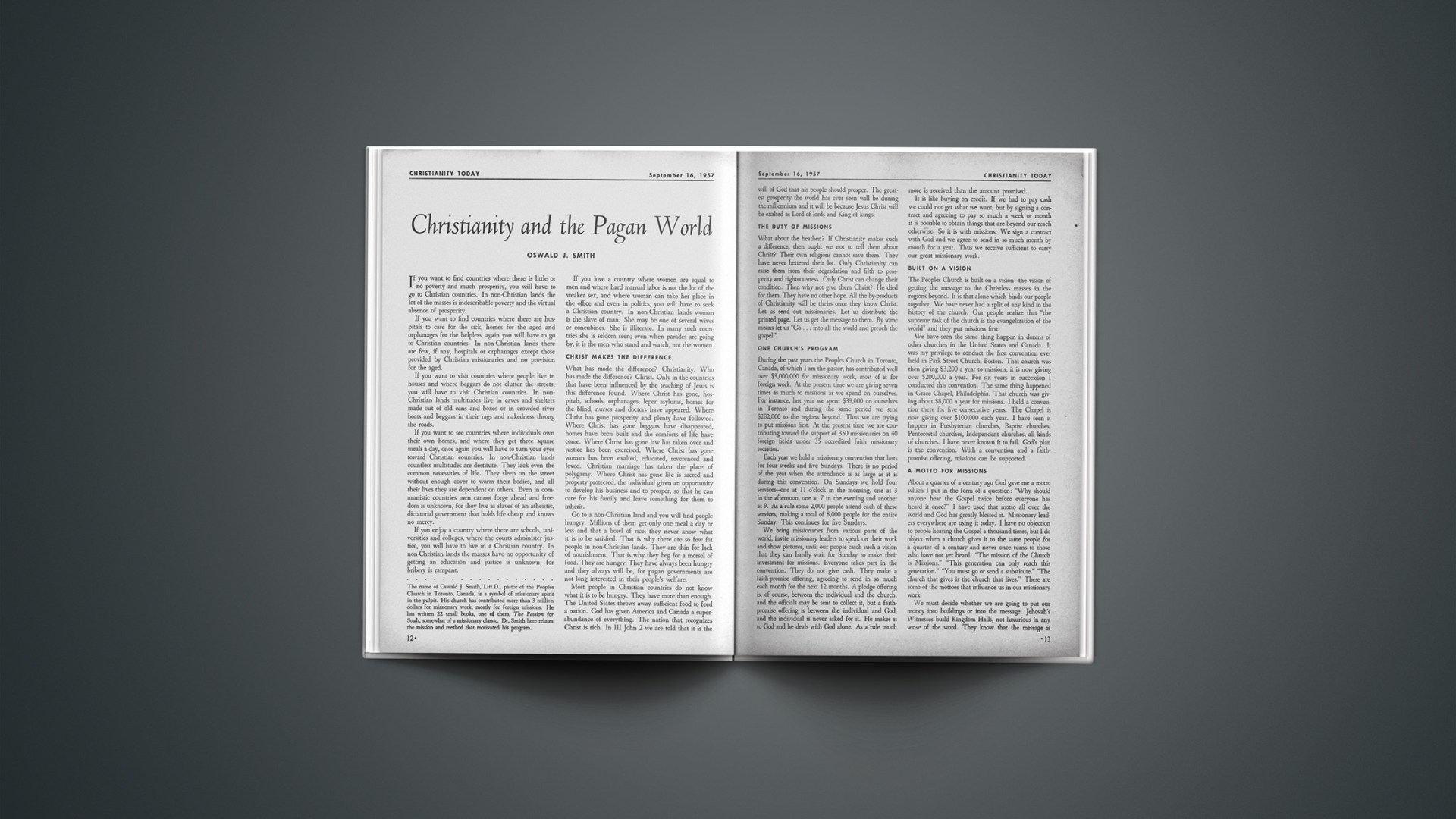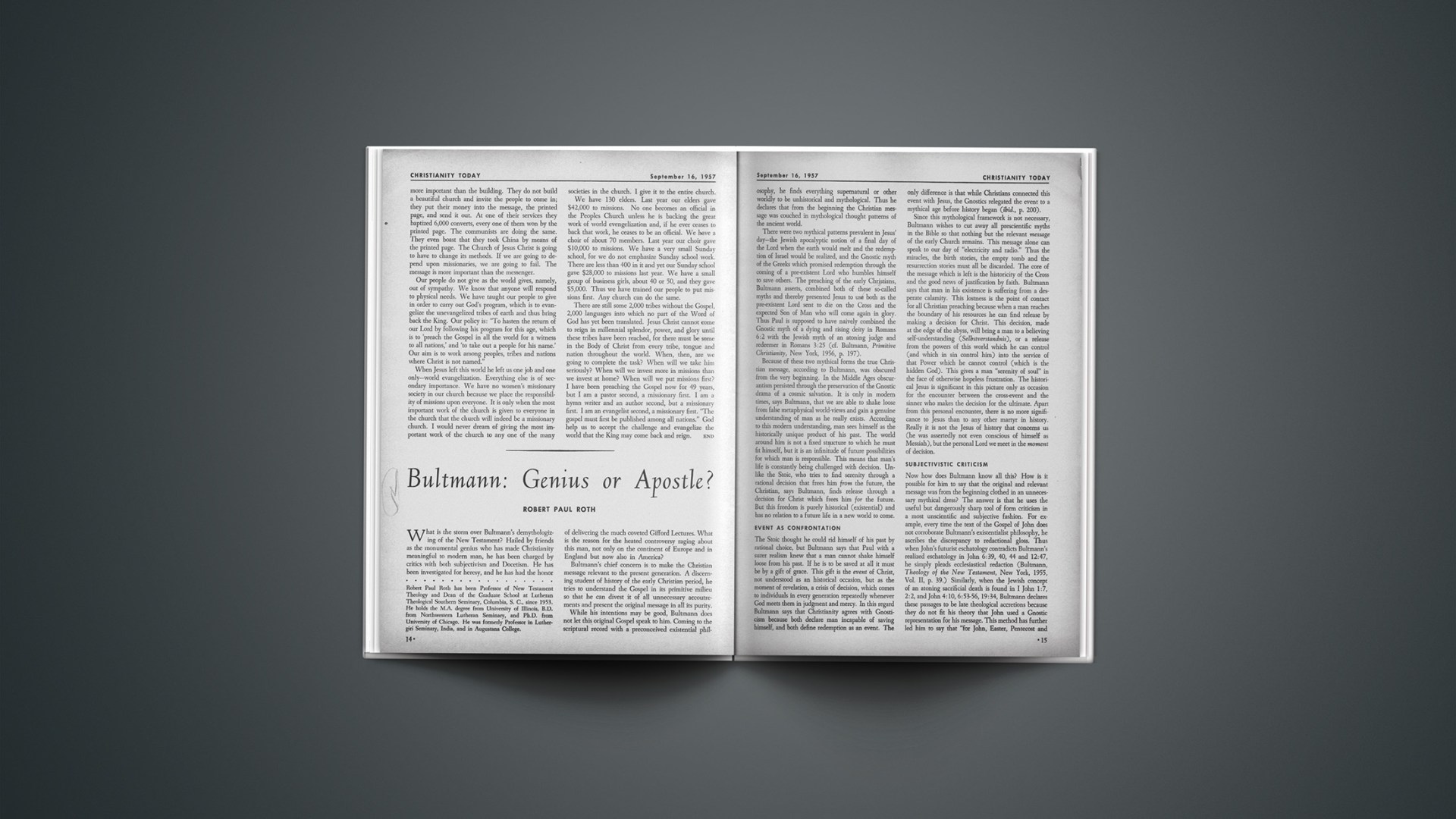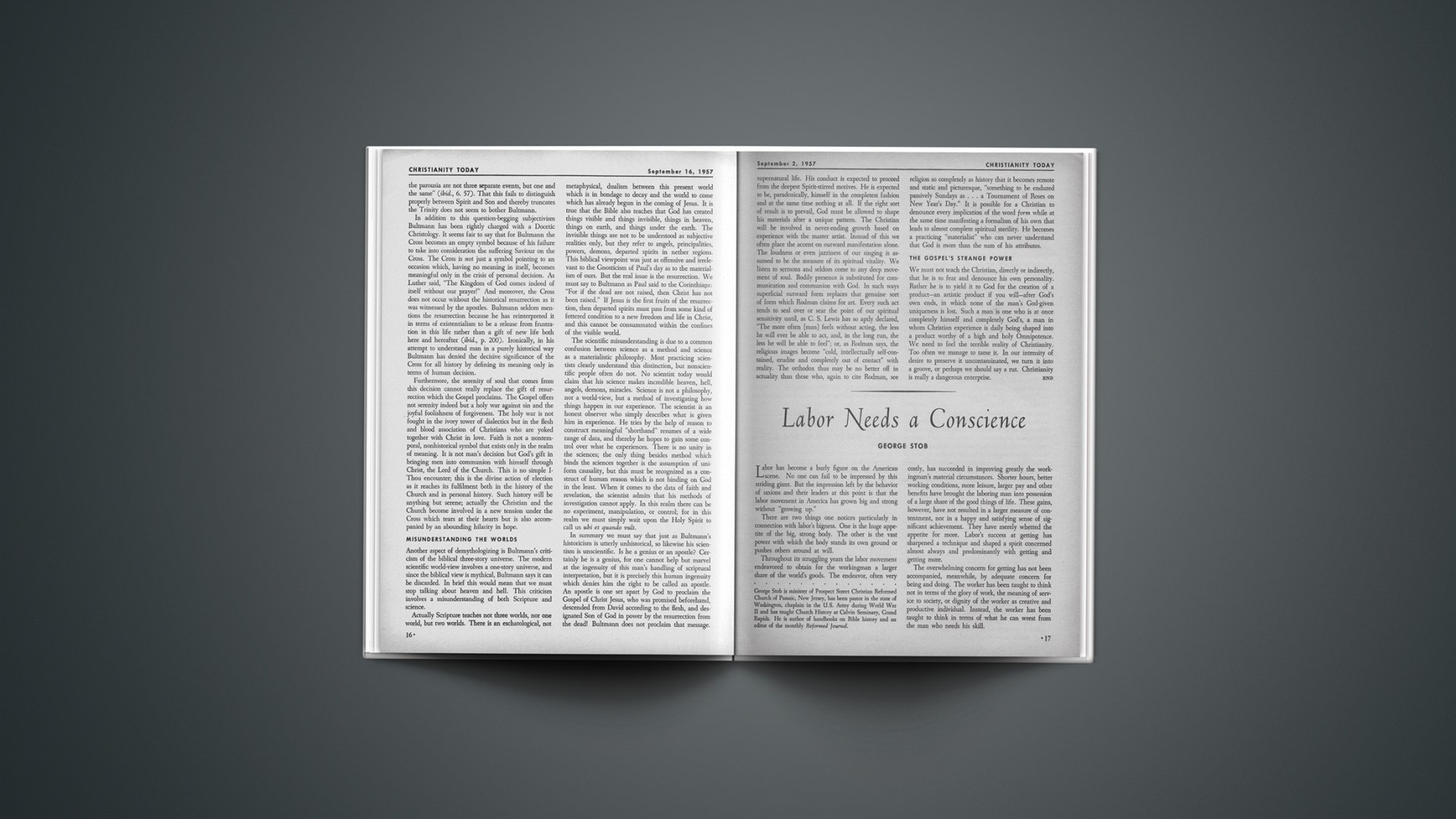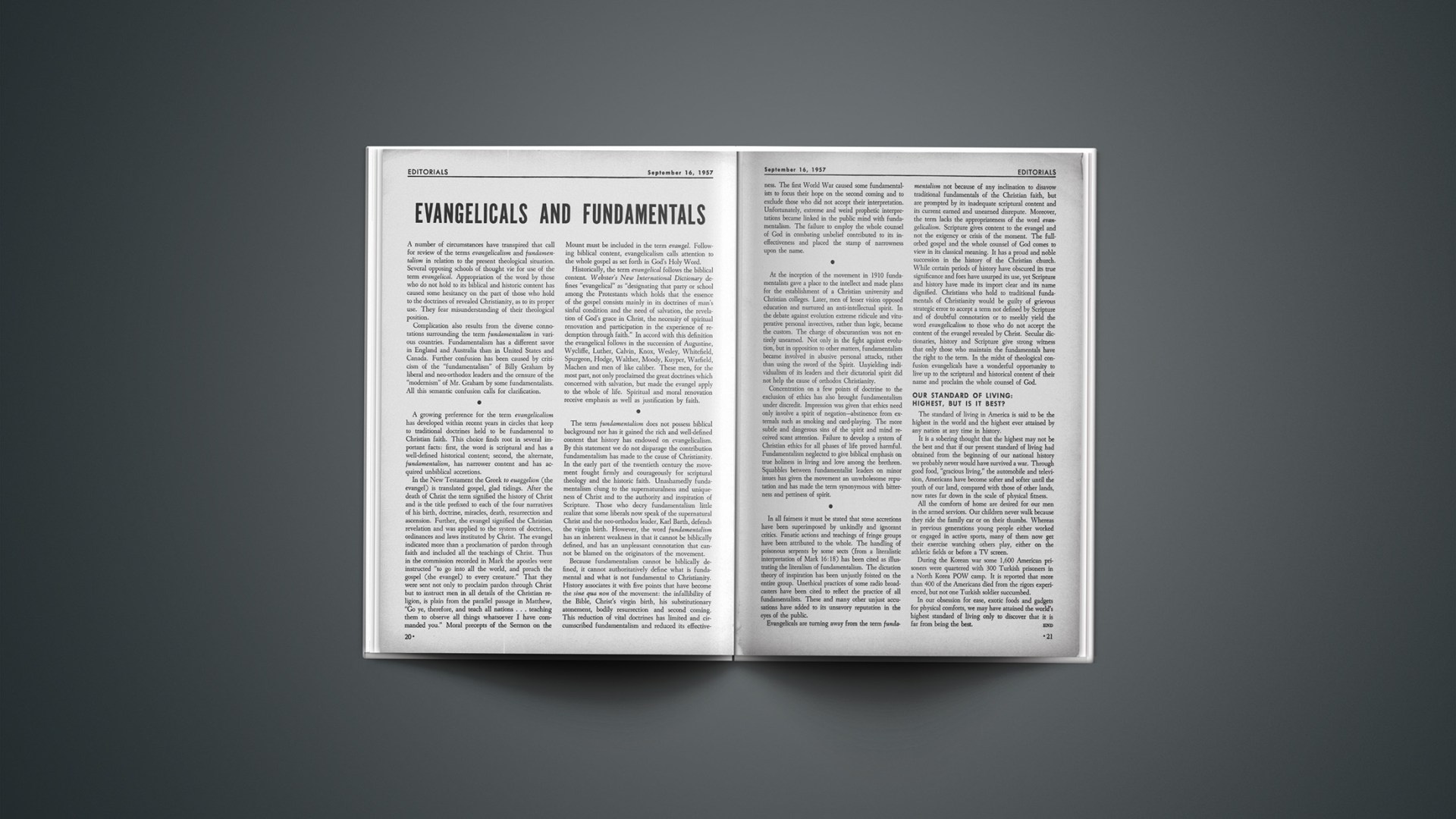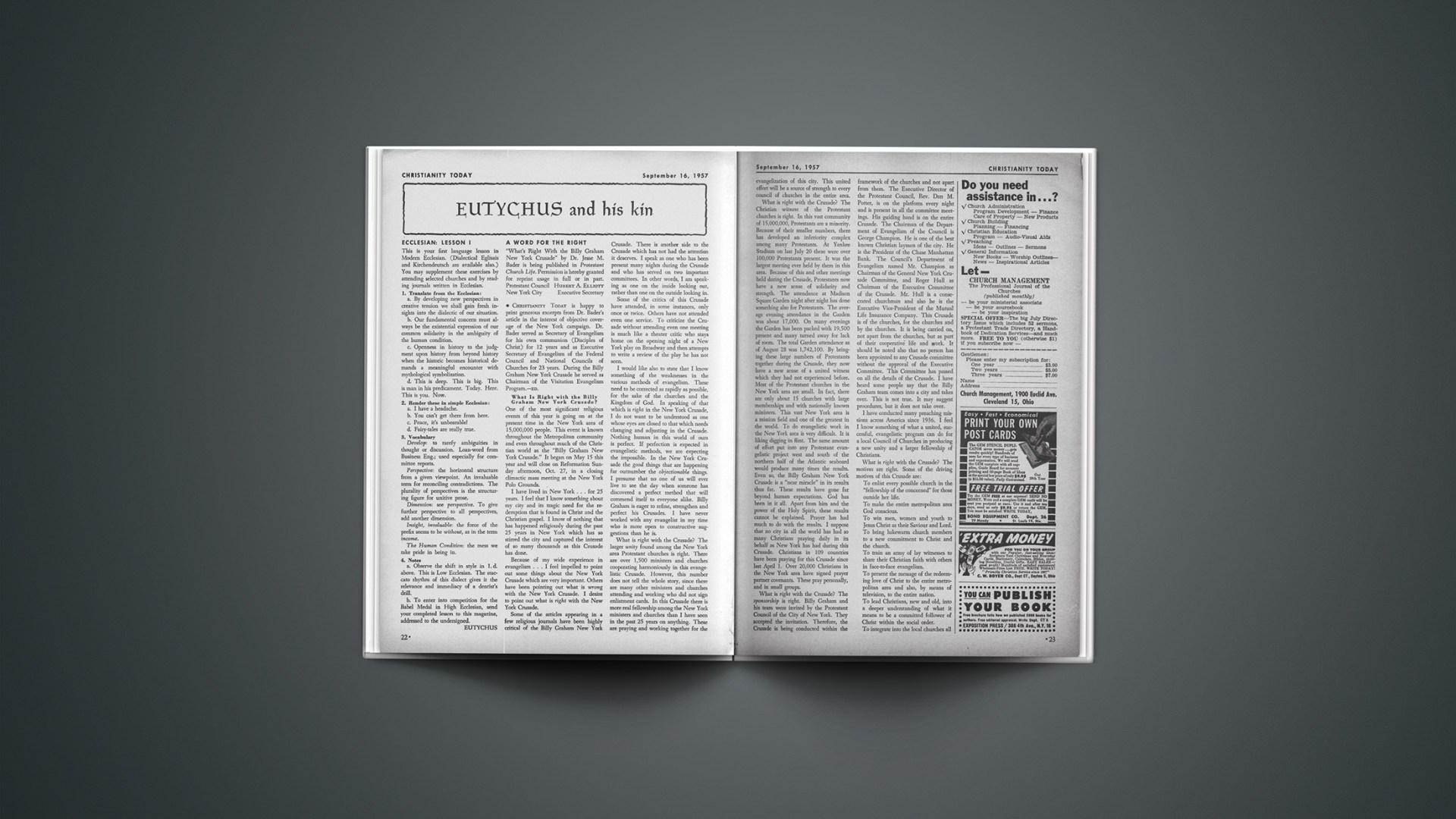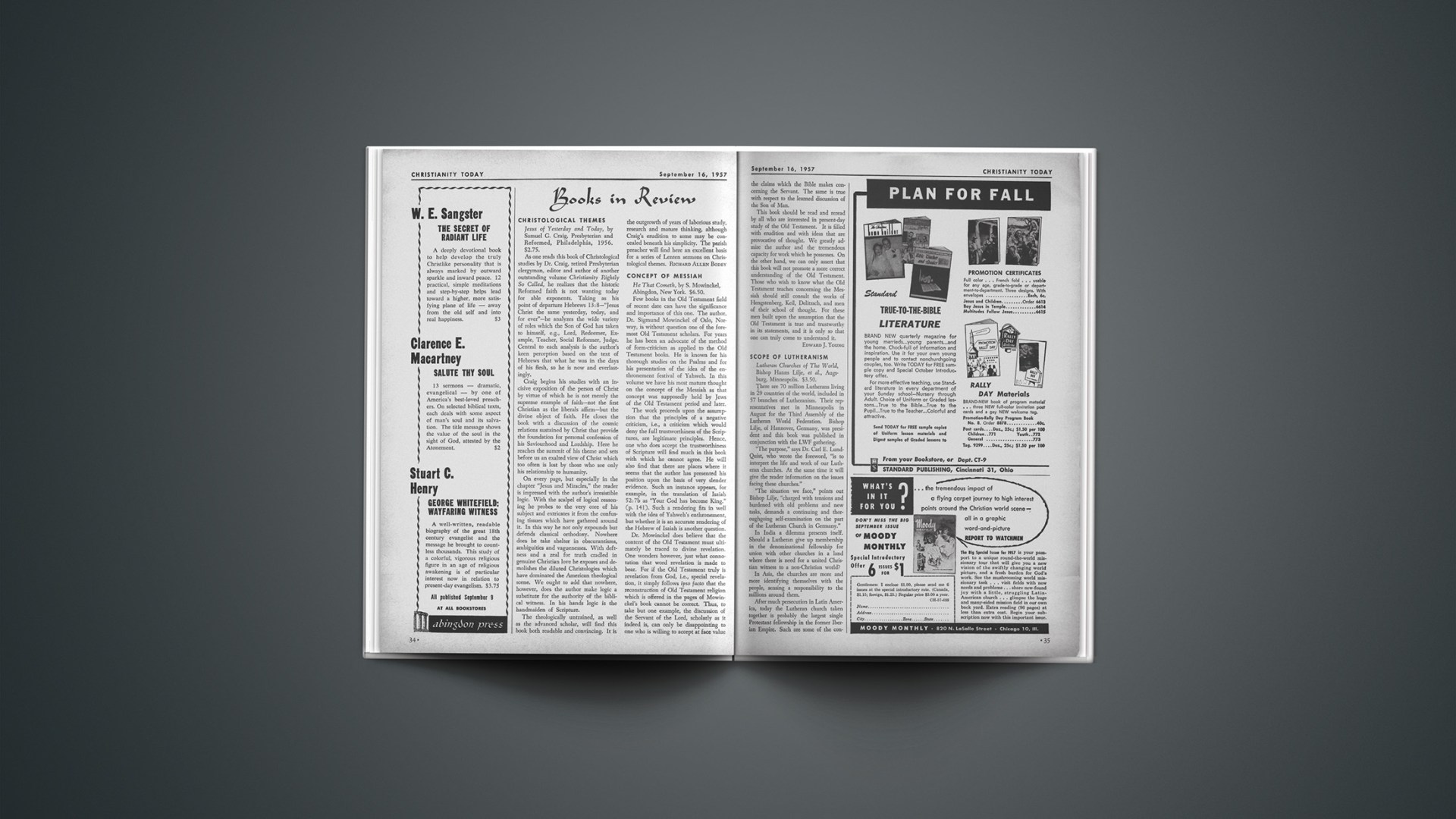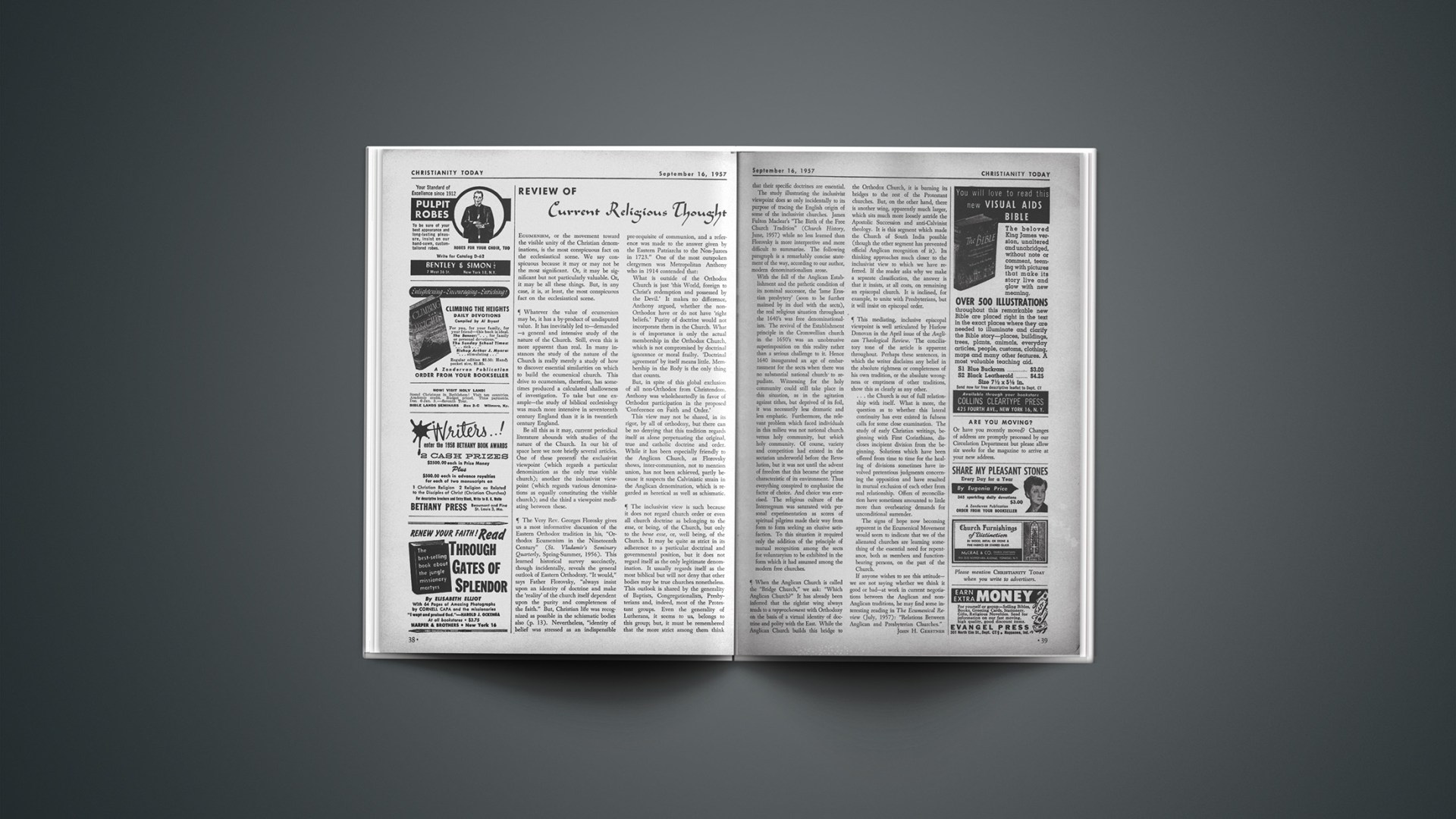The teaching of universalism is one which has divided Christian thinkers since the days of Clement of Alexandria and Origen. The subject has been raised in recent years with new force, so that it challenges consideration from the point of view of newer theological currents. The Christian Gospel raised the blunt question: “Will there be lost men who finally find themselves irrecoverably in outer darkness?” Universalism answers this question in the negative.
Early universalism held that man was created with opportunity of improvement as enduring as his being. This was the view of Clement of Alexandria. Origen, his pupil, rooted his universalism in the Platonic doctrine of the pre-existence of souls. The major thrust of his teaching was that human souls were now in bodily garb for the purposes of discipline and education, the outcome of which was held to be necessarily favorable. In similar vein Gregory of Nazianzen held that all punishments led necessarily to salvation. In his view God permitted evil only because he foresaw that all would be saved.
In the Middle Ages, John Scotus Erigena, following Plato’s view that our earthly life is the result of the imprisonment of the pre-existent soul in a body, taught that Jesus came to repair the entire damage, and finally to restore all to God. In general, medieval theology condemned universalism. Thomas Aquinas gave the classic formulation of the Roman church’s opposition to it, asserting that partialism was not only in keeping with the doctrine of God’s grace but that it was required by the clear statements of Scripture. Protestant orthodoxy continued the same teaching, asserting even more emphatically that the Scriptures are the final court of appeal at this point, and that they teach that the final reconstitution of all things in Christ would be accomplished only at the price of the eternal loss of a portion of mankind.
The last 50 years have witnessed a restatement of the case for universalism, given skillful expression by a number of able theologians. It will be helpful to know the basic arguments by which these defend the view that all will ultimately be saved.
Karl Barth has given expression to his belief that God’s final triumph must include the salvation of all men, in terms of what has been called “Christomonism.” In seeking to give a full account of faith as it relates to all of human life, including the mystery of man’s struggle with evil, Barth insists that Jesus Christ is the Elect Man and that we are elected in him collectively—not as separate individuals. It was Emil Brunner who first raised a vigorous protest against Barth’s weird doctrine of election and who pointed out its universalistic implications.
Reinhold Niebuhr has in less systematic fashion announced a similar doctrine. He sees salvation as being always in principle, not in fact. To him divine action is at present hidden action; we can only know it indirectly. Thus to Niebuhr as to Barth, our best attitude is that of taking our place with the sinners, living in penitence moment by moment. His confidence seems to be that the ultimate well-being of all souls must be achieved eschatologically. What Niebuhr fails to see is that his principles do not clearly rule out the possibility that there may be men with a hardness of heart which eternity does not change.
British Advocates
In Great Britain the three major recent exponents of universalism are Dr. C. H. Dodd, Dr. J. A. T. Robinson and Dr. H. H. Farmer. Dr. Robinson defends the view that universalism is in keeping with the Christian Gospel upon the ground that if divine love is omnipotent it must finally eliminate all opposition to itself. He recognizes that this involves the doctrine of human freedom, but insists that freedom can be safeguarded in a manner harmonious with the doctrine that all shall finally come to contrition. He holds that an all-compelling love can nevertheless leave freedom intact, because “the very act of submission is an act of freedom and embodies the assertion of its eternal integrity” (Scottish Journal of Theology, June 1949).
Dr. H. H. Farmer follows a similar line of approach in his volume The World and God. He assumes that if God is holy love, then we must conclude “that not only is he seeking to reconcile every individual to himself, but also that he will in the end succeed in so doing … Thus the profound concern of religious faith for God’s ultimate victory seems in its Christian form to move unavoidably towards universalism” (p. 255). He rejects the idea that the destiny of man can be once and for all settled by what happens in this world and is thus forced to assume, gratuitously we think, a post mortem existence in which even the most stubborn spirits are brought to yield to the truth.
Dr. Farmer feels that we must restate the ideas of freedom and of coercion. He insists that, given a theoretically eternal opportunity, God can manifest his wisdom with such force that it can no longer be resisted. He allows that the process may entail a very long period of time and much suffering. However, he believes, just as an irresistible logic may bring us to conclusions which we may not like but nevertheless accept, so also the appeals of God in the post mortem situation may bring even the most recalcitrant soul to yield to divine mercy, without his personality being overridden in the process.
American Supporters
In this country, Dr. Robert L. Calhoun puts the case in a slightly different form in his volume God and the Common Life. He insists (p. 248) that God’s redemptive world must be as extensive as his work within man’s environment. He infers from the triumph of God in the cosmos that “The Hound of Heaven” will never ultimatively fail, but will bring to bear upon men such influences, from within and from without, that they will hear and respond.
From similar premises, Dr. Harris Franklin Rall insists that since God has worked with success through ages of cosmic development, it would be irrational if he were to fail to achieve his objectives in the salvation of men. Assuming that God is greater than evil, he reasons that ethical triumph, no less than cosmic triumph, is implicit in divine activity. Rall’s conclusions are conditioned by his view that salvation is chiefly positive in nature. That is to say, he understands salvation almost exclusively in terms of the achievement of eternal life, not as escape from eternal death and outer darkness.
A word needs to be said with reference to the implications of the thought of Rudolf Bultmann and of Paul Tillich for the subject at hand. Both of these theologians are concerned primarily with the way in which the Gospel is to be interpreted today. They feel that a contemporary understanding of the gospel can best be expressed in terms of an existentialist philosophy, which lays stress upon living decisions in the present, rather than in terms of traditional theological expressions concerning either the past or the future. Thus such terms as “the wrath of God” and “the final judgment” are paradigms expressing dramatically the absoluteness and unapproachability of God. These and similar modes of speech are held to be poetic, useful chiefly to evoke the mysterium tremendum, or the overpowering sense of awe in the presence of the Divine. To such a view, of course, the teachings of Scripture concerning the factuality of either future blessedness or future perdition become meaningless and irrelevant.
Perhaps the most pronounced of the American exponents of modern universalism is Dr. Nels F. S. Ferre. The cornerstone of Ferre’s system is that God combines in himself the ideal and the actual, is absolutely sovereign, and will finally save all men. The final outcome of the course of things is beyond our present power of understanding. By “faith,” however, he sees God as finally supreme above all.
Ferre sets up an antithesis between God’s love on one hand, and his power and justice on the other. From this dialectic he concludes that if any of the sons of men were to be irrevocably lost, God would have acted in a manner which was both “subjustice” and “sublove.” He, like Dr. Farmer, assumes a set of conditions after death in which those who die impenitent here will be once again faced with both the terror of evil and the grace of Christ. Ferre’s language is picturesque; he sees men in this situation promptly perceiving themselves to be out of their proper element, and in consequence quickly beating a retreat to Father’s house.
Fallacy And Oversight
These modern assertions of universalism share more or less largely in three serious fallacies and in one critical oversight. Their exponents assume, first, that anything less than universal salvation is unthinkable and therefore impossible. They are unwilling to allow as a possibility that which seems to them to be unthinkable. Now it needs to be said that some of the subjective factors involved here come as reaction to the ill-advised and lurid preaching upon the subject of hell by well-meaning persons. Who of us has not heard some minister deal with the subject of eternal perdition in such manner as to create suspicion that he was in reality giving vent either to his own feelings of aggression or to his own frustration? This prompts one to add, homiletically, that no minister is prepared to preach upon the subject of hell until his soul has been gripped by the poignant fear that some of his audience may make their bed there.
The supposed unthinkability of eternal punishment rests, in general, upon what we believe to be a faulty human analogy. Universalists tend to feel that the love of God must be like human love, raised to the nth power. Now it is clear that there is a relation between God’s love for us and the love of the parent for the child. “Like as a father pitieth his children …” But this analogy must have its limits, and these limits are reached when we face the clear words of our Lord concerning “the strait gate” and “the great gulf.” It is significant that such statements, together with our Lord’s solemn references to “the shut door” and to “both soul and body cast into Gehenna,” are neatly bypassed by universalists.
These statements seem clearly to reveal in concrete form the realities of the situation as God sees it. No abstract reasoning on our part can hope effectively to explain away these statements, since they rest upon what God has actually done in history through his Son. The Cross goes beyond any of our logical processes of analogy in which we may try to set God’s love and God’s power in antithesis.
Rationalizing Iniquity
The second fallacy is the assumption that the problem of evil is capable of being rationalized. Universalism shares the weakness of absolute idealism at this point. It needs to be remembered that evil is ultimately illogical and unsystematic in character. Those who assert or imply that evil can easily be transcended by reason, or rendered logically coherent by any process of dialectic, have forgotten that our Lord speaks of “the mystery of iniquity.”
Both ancient and modern universalism fail to see that sin is in its essence ultimately contradictory, so that the gulf between the sinner and God cannot be bridged by human reason. Men are reconciled to God only in terms of the activity of God at the Cross. At Golgotha the mystery of evil was not denied; man was reconciled to God by an act which at the same time affirmed the bottomless reality of sin. No unitary interpretation of existence can possibly do justice to the mystery of iniquity, and it is perennially true that the preaching of the Cross is foolishness to the wisdom of this world.
The third fallacy of universalism lies in its shallow understanding of Calvary. Its proponents fail to see that as the darkness settled around our divine Lord at Gethsemane, and as it enveloped him on the Cross, it was not a darkness springing from a normal manifestation of his will-to-live, but a darkness born of the shocking realization that shortly divine love was to be pressed to the point of no return. From henceforth the frightful possibility should exist that in spite of God’s absolute love for men, some may resist in arrogance and selfishness and go into eternal night. In other words, in the Cross the incredible became possible; men henceforth might, in a personal and decisive rejection of divine mercy, manifest the incredible mystery of iniquity.
What is needed to correct this third fallacy is, of course, a more profound insight into two things: first, into the Eli, Eli lama sabachthani of our Lord upon the Cross; and second, into the unfathomable horror of the act by which men, in arrogance and proud denial, refuse the ultimate work of love at Calvary. When one grasps these in their profundity, he will scarcely dilute the significance of the sufferings of our Lord by a declaration of universalism. He will see, in the light of the Cross, that hell is no crude medieval invention but a hideous reality, prefigured here and now in the wreckage of character evident all about us, and the ultimate and inevitable consequence of the power of men finally to contradict God and to depart from him.
Finally, universalists overlook the clear statements of Scripture concerning the possibility of a final and decisive rejection of the love of God in Christ and a consequent eternal estrangement of the human soul. Reference has been made to the neglect of the statements of our Lord which can scarcely have any other significance than that the day of mercy has its final moment, and that some will reach this moment in impenitence. Worthy of special study in this connection is his account of the rich man and Lazarus, with its total lack of any indication of a postmortem repentance and its clear statement that death precipitates a character finality. “Neither can they pass to us that would come from thence!” To this may be added the statement concerning Judas, that “it would have been better for that man had he never been born.”
False Guides Amid Urgency
In the days of his flesh our Lord continually emphasized two things: first, that eternal life is available to all men; and second, that it is the urgent duty of all to accept it promptly and immediately. This is the “word of eternal life.” Urgency was and is the keynote of the proclamation of the Church. “Knowing therefore the terror of the Lord, we persuade men,” said Paul. The reason is not far away: “The love of Christ constrains us as we make this judgment that when Christ died, all died.” This urgency is not merely rhetorical; it springs from the tragic fact that the kerygma is both a savor of life unto life and a savor of death unto death.
In the light of these things, it seems incredible that men entrusted with the proclamation of the Gospel should take away the railings from the precipice roads of life. We cannot refrain from voicing the conviction that those who thus remove the red flares and the danger signals do so as false guides who stand in desperate need of returning for instructions to him who said, “Strive to enter in at the strait gate: for many will seek to enter in and shall not be able.”
END



